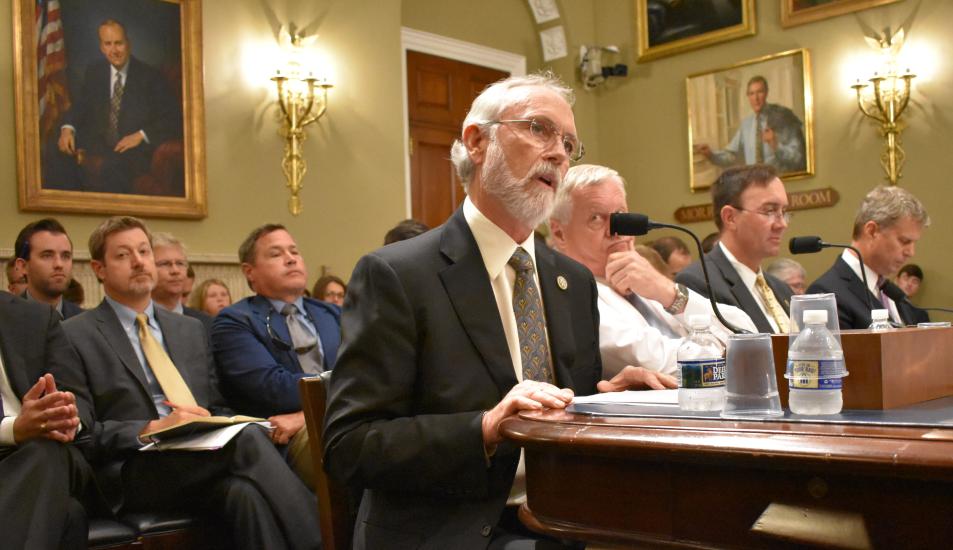Newhouse Endangered Species Act Reform Bill Receives Congressional Hearing

Newhouse legislation would require transparency in federal ESA decisions
WASHINGTON D.C. – Today, Rep. Dan Newhouse (R-WA) testified before the House Natural Resources Committee at a legislative hearing on his bill, H.R. 1274, the State, Tribal, and Local Species Transparency and Recovery Act. H.R. 1274 would amend the Endangered Species Act of 1973 (ESA) to require the federal government to disclose to affected states all data used prior to any ESA listing decisions and require that the "best available scientific and commercial data" used by the federal government include information provided by affected states, tribes, and local governments.
Click Here to Watch Rep. Newhouse's Testimony on ESA Transparency Legislation
Transcript of Rep. Newhouse's testimony today:
Thank you very much Mr. Chairman, Ranking Member Grijalva, and Members of the Committee. It's great to be back with all of you as well.
I want to thank you for the opportunity to address this Committee in support of my legislation, H.R. 1274, the "State, Tribal, and Local Species Transparency and Recovery Act." And yes, we need a couple more words in there. This legislation is simple, and logical—by including state and local entities in federal determinations and decision-making, we can improve policy-making and reduce the impacts on states, municipalities, tribes, and local stakeholders, all while ensuring endangered species listing decisions include the best, pertinent data involved in such matters.
Federal agencies like the Fish & Wildlife Service are currently not required to share the underlying data used in listing decisions made under ESA with the states or local entities that would be impacted by such listing decisions. These agencies too often overlook local conservation plans that are developed to ensure the protection of native species and habitats. These local efforts should not be disregarded, for oftentimes, the counties or the local municipalities are among the best sources of information. Local stakeholders deserve to know whether their hard work is taken into consideration long before the end result of a federal listing decision is made public.
My bill will amend the ESA to simply require that federal agencies disclose all data used to promulgate a potential or final listing determination to the states and local jurisdictions affected by federal regulatory actions. The legislation also gives local stakeholders the opportunity to verify, dispute, or complement the information the federal agencies use in ESA listings. There have been too many examples of states' data and species recovery plans having been effectively ignored by federal agencies, even after earnest and costly efforts were made to develop comprehensive and effective plans at the local level. By providing states, tribes, and localities the data used to promulgate these proposed listings, an opportunity arises for local stakeholders to get involved and have their voices heard.
Two cases in my own district in Central Washington come to mind regarding transparency of federal decision-making involving specific species. Earlier just this year, the National Park Service and Fish & Wildlife released a draft plan to reintroduce in the North Cascades Ecosystem the grizzly bear. Both agencies claim the bears will be joining an existing grizzly population, however the last confirmed sighting of a grizzly bear in that area was in 1996. The people living in these communities deserve to know what data these federal agencies are basing their decisions on. I have expressed my deep concerns regarding the lack of sound science and data to support this decision and will continue to do so.
The case of the gray wolf also comes to mind. The Department of the Interior and the Fish & Wildlife Service published a proposed rule that would remove the gray wolf's listing over four years ago—and even found the "best available scientific and commercial information indicates that the currently listed entity is not a valid species under the Act." Yet, the wolf remains listed. The gray wolf is found in nearly 50 countries around the world and has grown substantially across its range. I can attest to that. I will continue to be a firm advocate of delisting the gray wolf and returning its management to the states.
On a final note, Mr. Chairman, I often share with my constituents that, as a farmer, I consider myself a conservationist and a true steward of the gifts God has given us. Farmers are on the forefront of protecting our nation's rich, natural heritage. I believe it is important that we preserve our forests, our natural resources, and wildlife for our children as well as our grandchildren to enjoy. This legislation will only strengthen that effort. By modernizing the Endangered Species Act, we can ensure its effectiveness in protecting imperiled species successfully. I look forward to working with you and with the Committee to move this legislation forward, and again thank you for the opportunity.
An earlier version of H.R. 1274 passed the House in the 113th Congress.
Rep. Newhouse introduced H.R. 1274 on March 1. The State, Tribal, and Local Species Transparency and Recovery Act was cosponsored by Reps., Ralph Abraham (R-LA), Kevin Cramer (R-ND), Paul Gosar (R-AZ), Gregg Harper (R-MS), Walter Jones (R-NC), Roger Marshall (R-KS), Steve Pearce (R-NM), Scott Tipton (R-CO), and Ted Yoho (R-FL). Click here for the bill text.